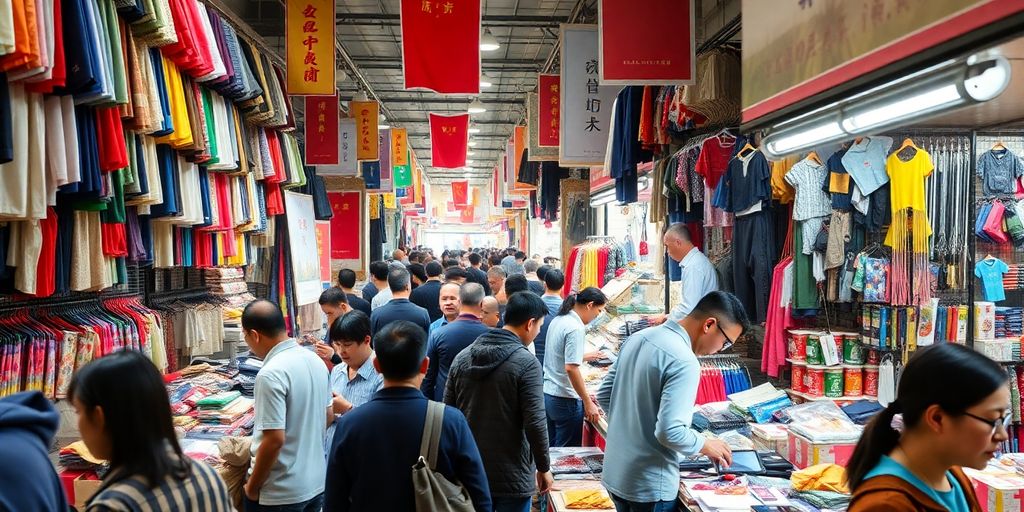Myślisz o rozpoczęciu współpracy z dystrybutorami hurtowymi w Chinach? To duży krok, ale może otworzyć świat możliwości dla Twojej firmy. Niezależnie od tego, czy jesteś małym startupem, czy dużą firmą, znalezienie odpowiednich partnerów w Chinach może mieć ogromne znaczenie. Ale od czego zacząć? Od odrobienia pracy domowej na rynku po utrzymanie silnych relacji biznesowych, jest wiele do rozważenia. Podzielmy to na siedem kluczowych kroków, które pomogą Ci zacząć.
Kluczowe wnioski
- Przed podjęciem jakichkolwiek działań należy dokładnie zbadać chiński rynek.
- Zidentyfikuj odpowiednich dostawców, którzy odpowiadają Twoim potrzebom biznesowym.
- Przeprowadzenie analizy due diligence w celu zapewnienia rzetelności i wiarygodności.
- Opracowanie skutecznych strategii negocjacyjnych w celu uzyskania najlepszych ofert.
- Zrozumienie wymogów prawnych i związanych z nimi konsekwencji.
1. Badanie rynku
Przed przystąpieniem do jakiegokolwiek partnerstwa, zwłaszcza na tak wyjątkowym rynku jak chiński, ważne jest, aby odrobić pracę domową. Zrozumienie sytuacji na rynku jest kluczowe. Oto jak możesz zacząć:
- Zrozumienie trendów konsumenckich: Wiedza o tym, czego chcą konsumenci, to połowa sukcesu. Czy skłaniają się ku produktom przyjaznym dla środowiska, czy też rośnie popyt na produkty luksusowe? Ten wgląd pomaga w dostosowaniu oferty produktów.
- Analiza konkurencji: Przyjrzyj się temu, co robią inne firmy. Kim są główni gracze? Jakich strategii używają? Uczenie się na ich sukcesach i błędach może dać ci przewagę nad konkurencją.
- Środowisko regulacyjne: Chiny mają swój własny zestaw zasad i przepisów. Ważne jest, aby je zrozumieć, aby zapewnić zgodność i uniknąć czkawek prawnych w przyszłości.
- Kanały dystrybucji: Zidentyfikuj najskuteczniejsze sposoby wprowadzenia produktu na rynek. Mogą to być platformy internetowe, sklepy fizyczne lub połączenie obu.
- Niuanse kulturowe: Zrozumienie różnic kulturowych może mieć ogromny wpływ na relacje biznesowe. Na przykład budowanie relacji i zaufania jest często ważniejsze niż natychmiastowe wyniki biznesowe.
Poświęcenie czasu na dokładne zbadanie rynku nie tylko przygotowuje na potencjalne wyzwania, ale także przygotowuje grunt pod udaną współpracę.
Kiedy współpraca z dystrybutorami produktów mlecznych w ChinachNiezbędne jest organizowanie bezpośrednich spotkań w celu omówienia linii produktów i synergii operacyjnych. Przejrzystość w zakresie cen i zobowiązań ilościowych ma kluczowe znaczenie dla budowania zaufania i zapewnienia udanego partnerstwa.
2. Identyfikacja dostawcy
Identyfikacja właściwych dostawców w Chinach jest kluczowym krokiem w budowaniu udanego partnerstwa z dystrybutorami hurtowymi. Znalezienie idealnego dostawcy może zadecydować o powodzeniu lub porażce przedsięwzięcia biznesowego. Oto jak możesz to zrobić:
- Zdefiniuj swoje potrzeby: Zanim zaczniesz szukać dostawców, jasno określ, czego potrzebujesz. Obejmuje to rodzaj produktów, standardy jakości i wymagania ilościowe.
- Zbadanie potencjalnych dostawców: Skorzystaj z katalogów online, targów i rekomendacji, aby sporządzić listę potencjalnych dostawców. Strony internetowe takie jak Alibaba i Global Sources to świetne miejsca do rozpoczęcia.
- Ocena możliwości dostawcy: Gdy masz już listę, zacznij oceniać możliwości każdego dostawcy. Przyjrzyj się ich zdolnościom produkcyjnym, środkom kontroli jakości i opiniom klientów z przeszłości.
- Kontakt i komunikacja: Skontaktuj się z wybranymi dostawcami. Komunikacja jest kluczowa - zadawaj pytania, proś o próbki i oceniaj ich szybkość reakcji.
- Porównanie i kontrast: Utwórz tabelę porównawczą, aby rozważyć zalety i wady każdego dostawcy. Weź pod uwagę takie czynniki jak ceny, czas realizacji i warunki płatności.
- Odwiedź dostawcę: Jeśli to możliwe, odwiedź fabrykę dostawcy. Daje to wgląd z pierwszej ręki w ich działania i procesy kontroli jakości.
Nawiązanie silnej relacji z dostawcą to nie tylko kwestia ceny. Chodzi o znalezienie partnera, który jest zgodny z celami i wartościami biznesowymi.
Aby uzyskać bardziej szczegółowe informacje na temat wyszukiwania dostawców hurtowych lub dropshipping, sprawdź ten przewodnik.
Postępując zgodnie z tymi krokami, będziesz na dobrej drodze do zidentyfikowania dostawcy, który spełni Twoje potrzeby i pomoże Twojej firmie prosperować.
3. Należyta staranność
Kiedy jesteś gotowy do rozpoczęcia współpracy z dystrybutorami hurtowymi w Chinach, odrobienie pracy domowej jest bardzo ważne. Dokładna analiza due diligence może zaoszczędzić wiele bólu głowy w przyszłości.
Kluczowe etapy badania due diligence
- Sprawdzenie przeszłości: Po pierwsze, zapoznaj się z historią dystrybutora. Przyjrzyj się jego osiągnięciom, wcześniejszym partnerstwom i reputacji na rynku. Ten krok pomoże ci zrozumieć, z kim masz do czynienia.
- Kondycja finansowa: Sprawdź ich sprawozdania finansowe. Czy są one stabilne? Czy mają jakieś długi, które mogą być niepokojące? Chwiejny finansowo partner może nie być wiarygodny na dłuższą metę.
- Zgodność z prawem: Upewnij się, że przestrzegają wszystkich niezbędnych przepisów i regulacji. Obejmuje to licencje, certyfikaty i wszelkie kwestie prawne, z którymi mogli się zetknąć. Nie chcesz tutaj żadnych niespodzianek.
- Inspekcja obiektu: Jeśli to możliwe, odwiedź ich obiekty. Pozwoli to przyjrzeć się z pierwszej ręki ich działalności, procesom kontroli jakości i ogólnym możliwościom.
- Kontrole referencyjne: Porozmawiaj z ich obecnymi lub byłymi klientami. Może to dać ci wgląd w ich niezawodność i jakość usług.
Poświęcenie czasu na dokładne zbadanie potencjalnych partnerów może zapobiec nieporozumieniom i zapewnić płynniejsze relacje biznesowe. Lepiej jest dowiedzieć się wcześniej, czy są jakieś sygnały ostrzegawcze.
Dla tych, którzy potrzebują pomoc w opracowaniu odpowiedniego profilu partneraKluczowe znaczenie ma jasne zrozumienie tego, czego szukasz w partnerze, co może kierować twoimi poszukiwaniami, identyfikacją i weryfikacją potencjalnych partnerów.
4. Strategie negocjacyjne

Podczas pracy nad transakcjami z dystrybutorami hurtowymi w Chinach bardzo ważne jest posiadanie dobrego planu negocjacji. Nie chodzi tylko o uzyskanie najniższej ceny, ale o zbudowanie solidnej relacji które mogą trwać latami.
Zrozumienie niuansów kulturowych
W Chinach negocjacje często obracają się wokół koncepcji "guanxi", co oznacza relacje. Chodzi o budowanie zaufania i wzajemnego szacunku. Nie jest to coś, co dzieje się z dnia na dzień; wymaga to czasu i wysiłku. Tak więc, kiedy zaczynasz negocjować, pamiętaj, że nadawanie priorytetów relacjom może prowadzić do lepszych wyników długoterminowych.
Wyznaczanie jasnych celów
Zanim jeszcze zaczniesz rozmawiać o liczbach, upewnij się, że wiesz, czego oczekujesz od transakcji. Oto kilka rzeczy do rozważenia:
- Zakres cen: Poznaj swój budżet i maksymalną kwotę, jaką jesteś w stanie zapłacić.
- Standardy jakości: Jasno określ, jakiej jakości oczekujesz.
- Terminy dostaw: Zrozumienie harmonogramu i elastyczność.
Skuteczna komunikacja
Komunikacja jest kluczowa w każdych negocjacjach, ale szczególnie w przypadku bariery językowej. Upewnij się, że:
- Używaj prostego, jasnego języka.
- Często potwierdzaj zrozumienie.
- Bądź cierpliwy i chętny do wyjaśniania rzeczy więcej niż jeden raz.
Elastyczność i kompromis
Negocjacje polegają na dawaniu i braniu. Przygotuj się na pewne kompromisy, ale znaj też swoje ograniczenia. Elastyczność może pomóc w osiągnięciu porozumienia, które będzie korzystne dla wszystkich.
Pamiętaj, że w udanych negocjacjach w Chinach mniej chodzi o natychmiastowe zyski finansowe, a bardziej o nawiązanie solidnej, godnej zaufania relacji biznesowej, która z czasem przyniesie korzyści obu stronom.
5. Rozważania prawne

Jeśli myślisz o współpracy z dystrybutorami hurtowymi w Chinach, kwestie prawne to poważna sprawa. Nie chodzi tylko o podpisanie dokumentów; chodzi o upewnienie się, że jesteś zabezpieczony pod każdym kątem. Zrozumienie otoczenia prawnego jest kluczem do ochrony interesów biznesowych.
Zrozumienie chińskich przepisów biznesowych
Zanim zaczniesz działać, zapoznaj się z przepisami dotyczącymi prowadzenia działalności gospodarczej w Chinach. Nie chodzi tu tylko o przeczytanie kilku artykułów; oznacza to prawdziwe zapoznanie się z tym, jak tam wszystko działa. Warto zatrudnić lokalnego prawnika, który zna tajniki chińskich przepisów.
Sporządzanie umów
Umowy są Twoim zabezpieczeniem. Upewnij się, że są one bardzo jasne i obejmują wszystkie podstawy. Oto kilka rzeczy, które należy uwzględnić:
- Warunki płatności: Jak i kiedy będziesz płacić.
- Harmonogramy dostaw: Kiedy można spodziewać się towaru.
- Standardy jakości: Jaki poziom jakości jest akceptowalny.
Ochrona własności intelektualnej
Ochrona marki i produktów jest koniecznością. Zarejestruj swoje znaki towarowe i patenty w Chinach. Pomoże to zapobiec próbom kradzieży pomysłów przez naśladowców.
Rozstrzyganie sporów
Nawet najlepsze plany mogą pójść nie tak. Zdecyduj z wyprzedzeniem, w jaki sposób będą rozwiązywane spory. Czy pójdziesz do sądu, czy arbitraż jest lepszą opcją?
Dopilnowanie wszystkich tych kwestii prawnych jest nie tylko mądre, ale wręcz konieczne. Teraz może się to wydawać kłopotliwe, ale później może zaoszczędzić mnóstwo bólu głowy.
Więcej informacji na temat zakupy hurtowe produktów z ChinUpewnij się, że Twoje ramy prawne są solidne. Zapewni to płynne działanie i mniej niespodzianek w przyszłości.
6. Planowanie logistyczne
Planowanie logistyki w Chinach może wydawać się układanką, ale chodzi o to, aby elementy znalazły się we właściwym miejscu. Skuteczne planowanie logistyczne jest podstawą udanej współpracy z dystrybutorami hurtowymi w Chinach. Oto kilka kluczowych kroków, które należy rozważyć:
- Zrozumieć lokalną infrastrukturę: Chiński system dystrybucji i logistyki przechodzi znaczącą modernizację. Jest to spowodowane dynamicznie rozwijającą się gospodarką, wejściem do WTO i rozwojem handlu elektronicznego. Czynniki te rewolucjonizując logistykę w kraju.
- Wybierz odpowiednie środki transportu: W zależności od rodzaju produktu, konieczne może być wybranie transportu lotniczego, morskiego, kolejowego lub drogowego. Każdy z nich ma swoje wady i zalety pod względem kosztów, szybkości i niezawodności.
- Optymalizacja rozwiązań magazynowych: Należy rozważyć, czy korzystać z lokalnych obiektów magazynowych, czy zarządzać zapasami z zagranicy. Lokalne magazynowanie może skrócić czas dostawy, ale może zwiększyć koszty.
- Plan dotyczący ceł i zgodności z przepisami: Poruszanie się po przepisach celnych może być trudne. Upewnij się, że cała dokumentacja jest dokładna, aby uniknąć opóźnień.
- Opracowanie planu awaryjnego: Zawsze miej plan awaryjny na wypadek potencjalnych zakłóceń. Może to być wszystko, od klęsk żywiołowych po zmiany polityczne wpływające na łańcuchy dostaw.
Poświęcenie czasu na zrozumienie i zaplanowanie logistyki pozwoli uniknąć bólu głowy w przyszłości. Chodzi o to, aby być proaktywnym, a nie reaktywnym, zapewniając płynne operacje od początku do końca.
7. Zarządzanie relacjami
Budowanie solidnych relacji z dystrybutorami hurtowymi w Chinach jest jak sadzenie drzewa. Wymaga czasu, uwagi i troski, ale gdy już wyrośnie, może stać wysoko i silnie przez lata. Silne relacje są podstawą udanego partnerstwa biznesowego. Oto jak skutecznie je pielęgnować:
Komunikacja jest kluczowa
- Regularne aktualizacje: Regularnie informuj dystrybutorów o zmianach produktów, zmianach na rynku lub innych istotnych wiadomościach.
- Otwarte kanały: Upewnij się, że istnieją otwarte linie komunikacji. Korzystaj z poczty e-mail, połączeń telefonicznych, a nawet aplikacji do czatowania, aby utrzymać stały przepływ informacji.
- Pętla informacji zwrotnej: Zachęcaj dystrybutorów do przekazywania informacji zwrotnych. Są oni na miejscu i mogą zaoferować cenne spostrzeżenia.
Budowanie zaufania
- Przejrzystość: Mów otwarcie o swoich celach biznesowych i oczekiwaniach. Szczerość sprzyja zaufaniu i wzajemnemu szacunkowi.
- Niezawodność: Dotrzymuj obietnic. Konsekwencja w działaniu buduje wiarygodność.
- Wsparcie: Zapewnij dystrybutorom niezbędne wsparcie. Niezależnie od tego, czy są to materiały marketingowe, czy szkolenia, upewnij się, że mają to, czego potrzebują, aby odnieść sukces.
Rozwiązywanie konfliktów
- Szybkie rozwiązywanie problemów: Nie pozwól, aby małe problemy przerodziły się w większe. Zajmuj się nimi od razu, gdy się pojawią.
- Zrozumienie perspektywy: Wysłuchaj punktu widzenia dystrybutora. Zrozumienie ich punktu widzenia może pomóc w polubownym rozwiązywaniu konfliktów.
- Kompromis: Bądź gotów znaleźć kompromis. Odrobina elastyczności może znacznie pomóc w utrzymaniu harmonii.
Budowanie silnych relacji z dystrybutorami to nie tylko biznes; to tworzenie partnerstwa, które przynosi korzyści obu stronom. Chodzi o zrozumienie wzajemnych potrzeb i wspólną pracę na rzecz osiągnięcia wspólnych celów.
Skupiając się na tych aspektach zarządzania relacjami, można zapewnić sobie owocną współpracę ze swoimi partnerami. Menedżer ds. relacji z dostawcami dostosowane do potrzeb producentów i dystrybutorów. Takie podejście nie tylko wzmacnia obecne więzi, ale także kładzie podwaliny pod przyszłą współpracę.
Zarządzanie relacjami jest kluczem do sukcesu w biznesie. Nie chodzi tylko o zawieranie transakcji; chodzi o budowanie zaufania i zrozumienia z partnerami. Jeśli chcesz dowiedzieć się więcej o tym, jak poprawić swoje umiejętności zarządzania relacjami, Odwiedź naszą stronę internetową, aby uzyskać pomocne wskazówki i zasoby!
Podsumowanie
Współpraca z dystrybutorami hurtowymi w Chinach może wydawać się dużym zadaniem, ale jest całkowicie wykonalna, jeśli podzielisz ją na etapy. Najpierw poznaj rynek i swoje potrzeby. Następnie znajdź odpowiednich dystrybutorów, którzy odpowiadają Twoim celom. Budowanie dobrych relacji jest kluczowe, więc utrzymuj otwartą i szczerą komunikację. Nie zapomnij sprawdzić wszystkich kwestii prawnych, aby uniknąć późniejszych niespodzianek. Po skonfigurowaniu, miej oko na to, jak się sprawy mają i bądź gotowy do wprowadzania zmian, jeśli zajdzie taka potrzeba. Chodzi o to, by być przygotowanym i elastycznym. Dzięki tym krokom jesteś na dobrej drodze do udanego partnerstwa.
Często zadawane pytania
Jaki jest pierwszy krok we współpracy z chińskimi hurtownikami?
Pierwszym krokiem jest przeprowadzenie dokładnych badań rynkowych w celu zrozumienia dynamiki popytu i podaży.
Jak mogę znaleźć wiarygodnych dostawców w Chinach?
Godnych zaufania dostawców można zidentyfikować za pośrednictwem platform internetowych, targów i kontaktów branżowych.
Co należy sprawdzić podczas badania due diligence?
Podczas badania due diligence należy zweryfikować referencje dostawcy, warunki panujące w fabryce i opinie poprzednich klientów.
Jakie są skuteczne strategie negocjacyjne?
Skuteczne strategie obejmują zrozumienie różnic kulturowych, jasne określenie swoich potrzeb i gotowość do kompromisu.
Jakie aspekty prawne powinienem wziąć pod uwagę?
Weź pod uwagę umowy, prawa własności intelektualnej i zgodność z lokalnymi przepisami.
Jak ważne jest planowanie logistyczne?
Planowanie logistyczne ma kluczowe znaczenie dla zapewnienia terminowych dostaw, efektywności kosztowej i płynności operacji.
Jakie są wskazówki dotyczące zarządzania relacjami z dystrybutorami?
Utrzymuj otwartą komunikację, szanuj normy kulturowe i regularnie sprawdzaj wyniki partnerstwa.
Dlaczego badania rynku są niezbędne?
Badania rynkowe pomagają zrozumieć krajobraz rynkowy, konkurencję i potencjalne możliwości.





